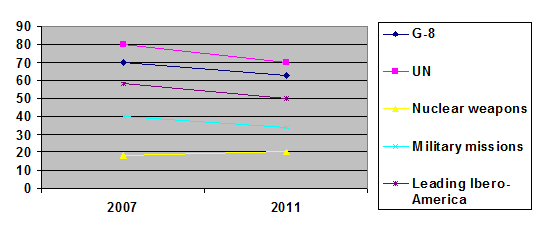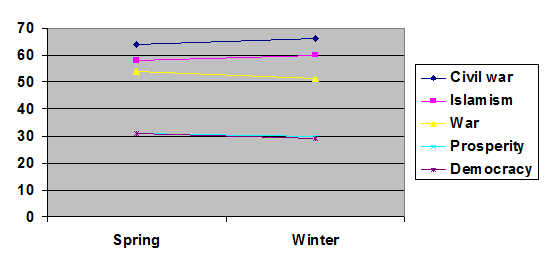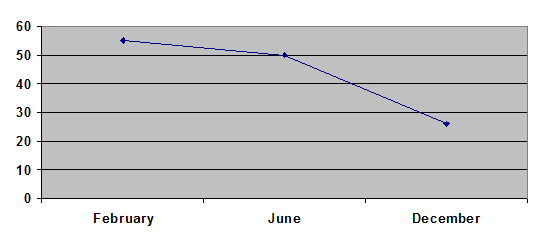TWENTY-EIGHTH EDITION OF THE BAROMETER OF THE ELCANO ROYAL INSTITUTE (December 2011)
Press Summary
Technical Data
Universe:general Spanish population, aged 18 and over (including Ceuta and Melilla).
Sample size:N = 1,003 interviewees.
Interview methodology used:telephone (interviewee called at home).
Sample size:stratified, directly proportionate to the distribution of the national population, with proportionate quotas according to age and gender.
Sample error:±3.2 for global data (1,000n); ±4.0 for subsamples (500 n), p=q=0.5 and a confidence interval of 95.5.
Survey period:from 23 November to 2 December, 2011.
Field work:GAD3 (formerly known as Gabinete de Análisis Demoscópico).
A New Foreign Policy for a New Government
- The majority of those interviewed want Spain to play an active role in the world. They account for 76% of the interviewees, compared with 19% who prefer that Spain stay out of international affairs.
Table 1. What do you think is better for the future of Spain? (%)
| Play a more active role in the world | Stay out of international affairs | Indifferent | DK/NA |
| 76.2 | 18.8 | 2.0 | 3.0 |
- Spaniards are more divided over multilateralism. While 49% are in favour of working with other countries within international organisations, 45% argue that Spain should look out for its own interests.
Table 2. With which of the following ideas do you agree most? (%)
| Working more with the international community | Looking out for one’s own interests | Neither | DK/NA |
| 49.1 | 44.9 | 0.9 | 5.2 |
Asked about which geographical areas Spain should concentrate on in its international relations, an overwhelming majority said Europe. It was the first option for two out of three Spaniards (66%). Next came the US, which was stated as a first option by 12% of those polled, and as a second option by 44%. In third place was Latin America: 8% as a first option and 16% as second. Therefore, there is a pretty clear order of priorities for the new government: (1) Europe; (2) the US; and (3) Latin America.
Table 3. In your opinion, what are the two geographical areas which Spain should concentrate on most in its foreign relations? (1st and 2nd options, %)
| Europe | Sub-Saharan Africa | Russia & Eastern Europe | US | Latin America | Asia-Pacific | Maghreb & North Africa | Other Muslim countries | None | All | DK/NA | |
| 1st option | 66.5 | 1.5 | 0.2 | 12.2 | 7.9 | 4.8 | 1.4 | 0.6 | 0.2 | 2.9 | 1.7 |
| 2nd option | 13.9 | 1.9 | 2.2 | 44.8 | 16.1 | 8.6 | 6.0 | 0.6 | 0.3 | 0.9 | 4.7 |
Within the area of international affairs, there are some very clear priorities as regards increasing expenditure:
- Development aid and cooperation (46%)
- Promotion of Spanish culture overseas (37%)
- Defence and embassies/consulates (15%)
Table 4. Should the government increase, maintain or decrease the following areas of expenditure (%)
| Increase | Maintain | Reduce | Indifferent | DK/NA | |
| Education and grants | 69.6 | 28.7 | 1.5 | – | 0.2 |
| Defence | 13.6 | 49.4 | 36.3 | 0.1 | 0.7 |
| Development aid and cooperation | 46.3 | 44.7 | 7.8 | 0.4 | 0.9 |
| Culture | 55.8 | 39.6 | 4.1 | 0.3 | 0.2 |
| Public order | 36.4 | 55.0 | 8.2 | 0.2 | 0.2 |
| Promoting Spanish culture overseas | 36.6 | 51.7 | 10.5 | 0.6 | 0.6 |
| Overseas promotion of the culture of Spain’s Autonomous Communities | 25.3 | 52.9 | 19.0 | 1.2 | 1.5 |
| Embassies, consulates, etc. | 14,7 | 50,0 | 32,3 | 0,5 | 2,5 |
A total of 78% of Spaniards polled would like Spain to wield more power and influence in the world. Focusing further on this issue, a list of goals was suggested. By order of which is the most desirable, the ranking obtained was the following:
- To be a permanent member of the UN Security Council (70%).
- Join the G-8 (63%)
- Lead the community of Ibero-American countries (52%)
- Participate in international military operations (34%)
- Become a nuclear power (20%)
Table 5. How important is it for Spain to:
| Very important | Quite important | Not very important | Not at all important | DK/NA | |
| Join the G8 club of the world´s richest countries | 20.1 | 43.4 | 20.3 | 10.6 | 5.6 |
| Be a permanent member of the UN Security Council | 22.1 | 47.9 | 17.9 | 7.9 | 4.2 |
| Possess nuclear weapons, like the US, the UK and France | 3.5 | 17.9 | 23.9 | 52.5 | 2.1 |
| Participate actively in international military operations | 6.4 | 27.4 | 29.8 | 32.3 | 4.1 |
| Lead the community or association of all Ibero-American countries | 15.0 | 37.0 | 26.6 | 16.1 | 5.4 |
In 2007 there were higher percentages, around 20% or more. It is interesting to note how the economic crisis and pessimism have lowered Spaniards’ aspirations considerably.
Graph 1. How important are they for Spain?
Positive Assessment of EU Reforms
- A majority of Spaniards (65%) felt EU reform was necessary and thus welcomed the results of last summit in Brussels. However, some 38% also said they are in favour of issuing eurobonds backed by the EU.
Table 6. How would you describe your assessment of the following measures with respect to the debt crisis?
| Very positive | Positive | Neither positive nor negative | Negative | Very negative | DK/NA | |
| Recapitalisation of banks | 3.8 | 34.2 | 10.6 | 37.0 | 5.6 | 8.8 |
| ECB reform | 8.0 | 53.8 | 12.6 | 15.4 | 1.8 | 8.4 |
| Reform of the EU in general | 8.8 | 55.6 | 12.6 | 13.4 | 2.2 | 7.4 |
| Bailouts and financial oversight of countries with problems | 6.4 | 49.4 | 18.8 | 17.2 | 1.0 | 7.2 |
| Issue of eurobonds | 4.6 | 34.4 | 17.0 | 21.8 | 1.4 | 20.8 |
Most of those polled, 63%, think it unlikely that Spain will have to be bailed out, although another 34% do not have that degree of confidence in Spain’s chances of averting such a fate.
Table 7. How likely do you think it is that the EU will have to bail out and intervene in Spain, as it has done with Greece, Ireland and Portugal?
| Very likely | Quite likely | Not very likely | Highly unlikely | DK/NA |
| 5.8 | 27.6 | 39.6 | 23.0 | 4.0 |
- Spaniards are divided over the ‘technocrat’ governments that are now in power in Italy and Greece. A total of 47% approve of them, but another 40% gives them a negative score.
Table 8. In Italy and Greece, unelected prime ministers who are experts in economics have been appointed. How do you assess this step?
| Very good | Good | Neither good nor bad | Bad | Very bad | DK/NA |
| 7.9 | 38.8 | 11.9 | 27.8 | 11.2 | 2.4 |
- Despite the tough times it is enduring, the EU retains a good image. With a score of 5.7, it is the most highly-rated international institution among those polled.
Table 9. On a scale of 0 to 10 (0 being very negative and 10 very positive), how do you rate the following international organisations (from 0 to 10)?
| Average | NA | NV | |
| EU | 5.7 | 0.2 | 2.2 |
| IMF | 4.8 | 1.8 | 4.0 |
| World Bank | 4.6 | 2.2 | 5.2 |
| ECB | 4.7 | 0.8 | 4.4 |
| G8 | 4.6 | 3.8 | 4.8 |
| G20 | 4.8 | 4.2 | 6.6 |
| NATO | 5.1 | 1.4 | 5.2 |
- Also retaining a good image are Germany and Chancellor Angela Merkel, the second most-highly rated leader, surpassed only by US President Barack Obama, with a score of 6.3.
Table 10. For each of these public figures, what score would you give them on a scale of 0 to 10, with 0 meaning very bad and 10 very good
| Average | NA | NV | |
| David Cameron | 5.5 | 11.1 | 13.1 |
| Nicolas Sarkozy | 5.6 | 1.2 | 5.8 |
| Barack Obama | 6.3 | 0.8 | 6.2 |
| Christine Lagarde | 5.1 | 21.5 | 14.3 |
| Angela Merkel | 5.9 | 1.4 | 7.0 |
| José Manuel Durão Barroso | 5.4 | 13.1 | 11.2 |
| Vladimir Putin | 4.5 | 7.8 | 15.1 |
Putin’s Poor Image
- At the opposite end of the high ratings scored by Obama and Merkel, Vladimir Putin is the worst-rated leader. He failed, with a score of 4.5. Russia’s image is better than its leader’s, but even so it only scored 5.3, the same as Greece.
Table 11. On a scale of 0 to 10 (0 being very negative and 10 very positive), what are your feelings towards the following countries?
| Average | DK/NA | |
| Italy | 6.1 | 1.6 |
| Germany | 6.5 | 2.0 |
| US | 6,1 | 2.4 |
| Greece | 5.3 | 2.0 |
| Portugal | 5.9 | 2.2 |
| Russia | 5.3 | 7.6 |
Fears Regarding the Changes in the Arab World and the Intervention in Libya
- Fears persist about the changes in the Arab world. A total of 70% see civil wars on the horizon, 60% expect a rise of Islamism and 52% anticipate conflicts with neighbouring countries.
Graph 2. Expectations for the Arab world
- A total of 45% of Spaniards have a positive opinion on the participation and role played by the Spanish armed forces in Libya, compared with 30% who do not support the mission.
Table 12. Opinion on the intervention in Libya (%)
| Very positive | Positive | Indifferent | Negative | Very negative | DK/NA | |
| Libya | 10.0 | 35.5 | 9.0 | 27.1 | 12.2 | 6.2 |
- A total of 49% would approve an intervention in Syria to help usher in democracy, while 35% reject the idea.
Table 13. Do you feel that the international community should intervene in Syria in order to overthrow the current regime and facilitate a transition towards democracy? (%)
| Yes | No | DK/NA |
| 48.9 | 34.9 | 16.3 |
- In any case there is a major inconsistency here because a majority of those polled, 52%, would not support Spain’s participation in such a mission.
Table 14. Should Spain take part in an international mission in Syria?
| Yes | No | DK/NA |
| 33.6 | 51.6 | 14.8 |
Economic Sanctions Against Iran
- A vast majority of Spaniards, 78%, suspect that Iran’s uranium-enrichment programme is a military one aimed at developing nuclear weapons.
Table 15. Despite warnings from the international community, Iran has kept up its research programme on uranium enrichment. What do you think its goals are?
| Peaceful, with civilian goals | Military, to build nuclear weapons | Indifferent | DK/NA |
| 10.2 | 77.8 | 2.2 | 9.8 |
- However, even in the current context of rising tensions, 73% prefer economic sanctions rather than the use of force against Iran (8%).
Table 16. What do you think should be done with Iran if it does not halt its programme?
| Apply force | Apply economic sanctions | Other | Indifferent | DK/NA |
| 8.0 | 73.0 | 8.4 | 2.2 | 8.4 |
Failure of Climate Change Talks in South Africa
- Second only to the international financial crisis, 45% of Spaniards (45%) consider global warming to be one of the biggest threats. In light of this, they will probably feel frustrated with the results of the Durban Summit in South Africa.
Table 17. Perception of possible threats to Spain’s vital interests (% of extremely important, important and not at all important)
| Extremely important | Important | Not at all important | DK/NA | |
| Islamic fundamentalism | 25.4 | 56.7 | 15. | 2.4 |
| International terrorism | 27.6 | 56.7 | 14.9 | 0.8 |
| Illegal immigration into Spain | 29.6 | 48.9 | 20.1 | 1.4 |
| Global warming | 45.5 | 46.9 | 6.4 | 1.2 |
| The international financial crisis | 54.0 | 44.0 | 1.8 | 0.2 |
| Iran’s possible development of nuclear weapons | 31.8 | 54.0 | 11.8 | 2.4 |
| The situation in Afghanistan | 19.6 | 59.6 | 18.2 | 2.6 |
| The situation in Pakistan | 19.6 | 57.2 | 19.0 | 4.2 |
- Environmental concerns have risen to second place because of the decline in the concern over international terrorism, a phenomenon which only 27% of those polled now consider a major threat, whereas in 2003-o4 the percentage was 70%.
Graph 3. Perception of the threat of international terrorism in 2011 (% of ‘very serious’)




